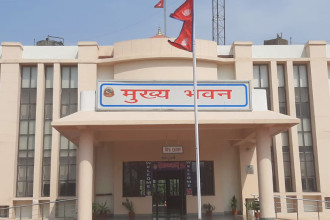-1746945712.jpeg)
KATHMANDU: Confederation of Nepalese Industries (CNI) has stated that budget for fiscal year 2025/26 unveiled by the government is balanced and aims to address current economic challenges while boosting private sector investment, though its implementation remains a concern.
CNI has welcomed measures supporting private investment, including granting new industries in Special Economic Zones (SEZs) and industrial areas a three‐year rent exemption, reducing monthly SEZ rents from Rs 20 to Rs 5 per square metre, and extending benefits to industries in industrial areas that export over 30% of their production. The organisation also welcomed 50% reduction in rent for industrial areas and revisions to laws on land acquisition and land ceiling.
The budget announces incubation centres operated in collaboration with the government, universities and tprivate sector; 75% tax exemption on income from IT service exports; 5% final income tax for individuals exporting IT services; and five‐year tax exemption for startup businesses with an annual turnover of up to Rs 100 million. Provisions for income tax and electricity tariff exemptions for IT‐based industries, hotels and resorts are also expected to attract investment.
Other measures include easier access to working capital loans for manufacturing, tourism, construction and housing sectors; permission for Nepali companies to open sales branches abroad and invest up to 25% of annual export income overseas; and support policies for RCC concrete, blacktopping, studies for standard gauge electric railways and systematic urban development with private sector participation.
The government has committed to reviewing laws on value‐added tax, income tax and excise duty to study multi‐rate VAT system, as previously suggested by CNI. The budget also states that supplementary environmental impact assessment will not be required if tree numbers change by up to 10% after report approval.
CNI called for greater private sector participation in constructing and operating industrial areas. It welcomed plans for modern industrial zones in Shaktikhor (Chitwan) and Mayurdhap (Makawanpur), and for SEZs in Panchkhal and Simara to be operated with private input. Provisions for sourcing construction materials, leasing government land for tourism infrastructure and incentives for hotels, resorts and the timber industry were noted.
Additional measures include a partnership for data centre construction and operation, dedicated facilities for uninterrupted electricity and security, an automatic database of international price trends to replace customs reference prices, fast‐track import and export with authorised businesspersons and upgrading integrated check posts to reduce business costs.
Further steps to facilitate digital payments include the abolition of VAT on clearinghouse services, cancellation of advance income tax on food grains and pulses at customs, removal of Rs 300,000 bank guarantee requirement for obtaining an EXIM code and provisions for free residential visas for experts and investors as well as digital nomad visas.
CNI noted omissions such as industrial development strategies, quality promotion and labelling requirements for imported goods, which should be prioritised in future budgets. Although many aspects of the budget are positive, CNI stressed that implementation has historically been weak and urged the establishment of a clear framework and greater accountability to achieve 6% economic growth target.
CNI has committed to continuing its constructive role in the budget’s implementation through its "Budget Watch" programme, engaging with stakeholders to ensure effective economic growth.






